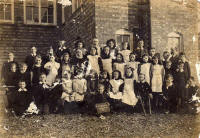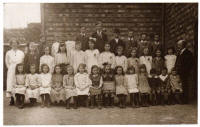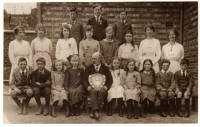|
17th
Century
In
the 17th Century, education was mainly the prerogative of the rich. However,
there was some kind of education available for the less privileged in the form
of 'dame schools' also known as 'common day schools'. These were run from
a kitchen, or outbuilding, by an untrained woman with enough ability to teach
basic reading, handwriting and arithmetic, as well as practical skills like
sewing. It is believed that there used to be a dame school in Cottingham on the
right hand side of the pathway that leads up to the Royal George from Corby
Road. This is now a private garden, and the present owners, Laurie and Irene
Beadsworth, recall finding a set of steps beneath the garden when they were
excavating for a new driveway.
1800s to early 1900s
The
1887 street map and OS
map show the old Cottingham school in Dag Lane. This school, originally for infants, was opened in 1871 for
92
children. Dag
Lane was subsequently renamed School
Lane and the school building is now a private house.
There was also a school in Middleton, opened in
1856 and enlarged in 1869, for 120 children. In the early 1900s, all the junior
age pupils from both villages were taught at the Middleton school, with the
infants attending the school in Cottingham. The old Middleton school is also now a private
house, located on Camsdale Walk at top of School Hill.
At
the turn of the 20th century, the curriculum at the school would have been
arithmetic, poetry, reading, composition, recitation, geography (British
colonies), history (to 1066), nature study, drawing, drill, music and
needlework.
|
|

1916-24, with Headmaster
Henry 'Tubby' Belshaw
(some names) |

1916-24, with Headmaster
Henry 'Tubby' Belshaw
Middle row, fourth from right,
Florence Davenport.
Back row far right, George Davenport |

1918-20, with Headmaster
Henry 'Tubby' Belshaw
Front row, fourth from right,
Florence Davenport; Back row
centre, David Hobbs |
|
Mid 1900s to present
The current Cottingham Church of England primary school on Berryfield Road was
opened in the late 1960s. The old school was kept open alongside the new one for
a few years, but eventually closed in the early 1970s.
Class teacher in the 1940s, Mr Kisby, is shown on some of the pictures
Below. Irene Beadsworth (nee Ansell) recalls him with fondness. "He was
everybody's favourite teacher" says Irene. "He was the most wonderful
storyteller and he loved art and poetry. He even wrote a book!"
Judi Davies-Stephenson, who attended the school in the 60s and 70s, also
remembers Mr Kisby. She says: "before he died, he gave away to the students
at the school a lot of his sketches and drawings. He was really an amazing
artist! I was lucky enough to get one of a willow tree.....I
also remember very well Mrs David the school cook. she looked after me very
well...."
David Dodd recalls: "Mr Kisby once a
beautiful etching of a fish about to be caught by a fisherman's hook. Sadly,
somewhere over the years it has been lost. The other thing I remember about him
was his frequent reference to his daughter Rosemary. She was about the same age
as our class, but did not attend Cottingham school. I don't think we ever met
her, but she was the yardstick against which he measured our academic progress."
|